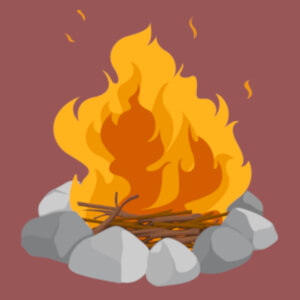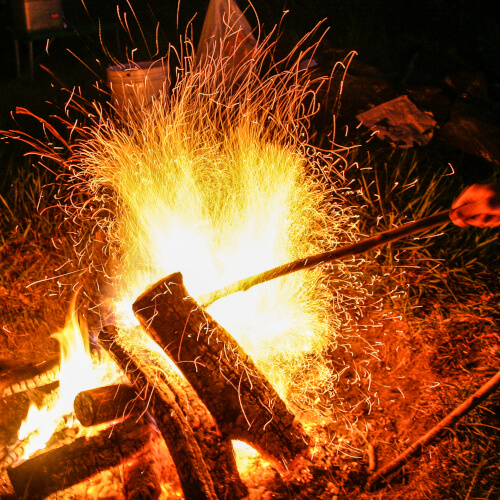



Hominid use of fire dates back to at least one million years ago, during the time of our ancestor, Homo erectus [1]. Archaeologists have discovered microscopic evidence of smoke and ashes from fires that were deliberately set by early humans. For instance, in Morocco, archaeologists found burned flint tools that were dated back to 300,000 years ago [2].
Fire has had a significant impact on human civilization. Early humans used fire to stay warm in colder environments, to provide light, and to cook food. In fact, the invention of cooking has been linked to the discovery of fire, as cooking meat and vegetables over an open flame can make them more digestible and reduce the risk of foodborne illnesses [1]. Fire also allowed early humans to create new tools and weapons, as well as to keep predators at bay.
Additionally, fire had a important social impacts, as those who were able to control fire held higher positions of power than others. It was a highly valued skill that could be used to protect and feed the community. Fire has also been used to create art, such as pottery, and to perform important ceremonies and rituals [2].
Early human communities, including indigenous peoples around the world, employed a sophisticated land management technique known as "firestick farming." This practice involved intentionally using fire to clear vegetation, promote desired plant growth, and create open areas for hunting, gathering, and farming.
Firestick farming had various benefits. It helped stimulate the growth of specific plants, reduce the risk of larger wildfires, and enrich the soil with nutrients through the ash left behind. Indigenous communities developed a deep understanding of the ecological role of fire and its impact on the land they inhabited. Their extensive knowledge and sustainable land management practices reflect their deep connection to the environment and their commitment to preserving its health and biodiversity.
Fire pistons, or gobek api in the Malay language, consisted of a tube with a tight-fitting plunger inside and a rubber or leather seal around it. To start a fire, a small piece of tinder is placed at the end of the piston. When the plunger is quickly pushed into the tube, the temperature of the air in the piston rises enough to ignite the tinder.
Fire pistons were handy in places where starting fires was challenging. They were portable and reliable, making them valuable tools for early humans on their journeys and for survival in different environments.
To undergo "fire bathing" or "fire therapy," patients willingly exposed themselves to intense heat and flames for medical purposes. They believed that this extreme heat could heal different illnesses and make them feel better overall.
Supporters of fire bathing claimed that the intense heat would improve blood flow, remove toxins from the body, and relieve conditions like rheumatism, paralysis, and even mental disorders. Some practitioners went to the extent of using special blankets soaked in flammable liquids and set on fire to make the experience even more intense and immersive.
Inside the Blombos Cave in South Africa, a series of engraved stones were discovered in 1991. These stones, dating back around 70,000 years, were carefully carved using heated flint tools into crisscross patterns.
Research suggests that the controlled use of fire by early humans led to a reduction in the size of our jaws and teeth. Before the use of fire for cooking, early humans likely consumed raw, tough foods that required more chewing and had a higher resistance to being broken down. However, the introduction of fire for cooking allowed our ancestors to soften and partially pre-digest their food, making it easier to chew and digest.
Over time, this change in diet and the consistent use of fire for cooking led to a decrease in the size of our jaws and teeth. With less need for powerful chewing, the human jaw gradually became smaller and more delicate compared to our earlier ancestors. This shift freed up space in our skulls, allowing for the expansion of our brain size and contributing to the development of our unique cognitive abilities.
The ancient Greeks used sunlight to start fires. In honor of this, the ceremonial torch used to kick off the Olympic games is still lit with a special parabolic, or curved, mirror that focuses sunlight into a beam hot enough to start a fire.
[1] Gowlett, J. A. J. (2016). The discovery of fire by humans: a long and convoluted process. Philosophical Transactions of the Royal Society B: Biological Sciences, 371(1696), 20150164. https://doi.org/10.1098/rstb.2015.0164
[2] Roebroeks, W., & Villa, P. (2011). On the earliest evidence for habitual use of fire in Europe. Proceedings of the National Academy of Sciences, 108(13), 5209-5214. https://doi.org/10.1073/pnas.1018116108